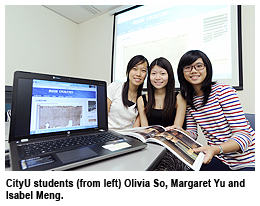CityU students help on Chinese version of digital Dead Sea Scrolls
Four students from the Department of Chinese, Translation and Linguistics (CTL) at City University of Hong Kong (CityU) have helped to develop a digital version in Chinese of the Dead Sea Scrolls held at the Israel Museum in Jerusalem.
They translated the text of the digital version, which was launched by the Israel Museum in Jerusalem in 2011. The text leads readers to high-resolution images and historical background information. The webpages of the digital version of the Dead Sea Scrolls had previously only been available in English. These ancient biblical manuscripts were discovered in the late 1940s near the Dead Sea in the Middle East.
“We could not have done this without the CityU students!” said Dr Susan Hazan, Israel Museum’s Curator of New Media and Head of Internet Office, adding that the names of the four students had been published in the Chinese webpages of the digital version in recognition of their efforts.
Chinese readers had been able to read about the Dead Sea Scrolls’ origin, history, and artistic and cultural characteristics following a successful online pilot of the Chinese webpages. The Museum planned to launch a digitised version of the Dead Sea Scrolls in Spanish and Portuguese, too, Dr Hazan said.
Two of the four CityU students assisted in the start-up of the Chinese translation project while interning at the Israel Museum in the summer of 2011. The other two went to Israel in the summer of 2012 to complete the translation and proofreading tasks.
Olivia So Yin-wai, a Year 3 student in CTL, recalled the pressure felt while working on the translation in the summer of 2011.
“The greatest challenge was handling religious concepts and religion-specific terminologies. The Museum arranged for us to visit the curator of the Shrine of the Book, a wing at the Museum that exhibits the Dead Sea Scrolls. The curator briefed us on the museum and the Scrolls. Also, we met two Taiwanese working as tour guides in Israel who helped us when we had to deal with difficult terms to be translated,” Olivia said.
Olivia greatly cherished the opportunity of participating in this English-to-Chinese translation project. “The Dead Sea Scrolls reflect the roots of Jewish ethnicity and culture. If the webpages are presented in multiple languages, they are accessible to more people in the world who will then be able to understand Israel,” she said.
Isabel Meng Qianyu, a Year 2 student, undertook an internship in the summer of this year. She was responsible for translating into Chinese the content of the main page and transcripts for related videos. “We were given the opportunity to view the original Scrolls. The pages are not very big but the manuscripts are exquisitely hand written,” she said.
Another four CityU students—two in the summer of 2011 and two in the summer of 2012–also interned at the Israel Museum, helping to develop a digital database to catalogue the Museum’s huge art and artifact collections.
Margaret Yu, a Year 3 student, said: “The cataloging system at the Museum is still paper based. Our job was to help upload the digital images and information about the collections into the digital cataloging system,” she said.
The experience of the eight CityU students, who were the only Asians among Israel Museum’s trainees, captures the spirit of CityU’s Discovery-enriched Curriculum (DEC).
Under the DEC, students go out to discover the unknown in the world and, equipped with confidence and a sense of involvement, to disseminate new knowledge for the benefit of society.


